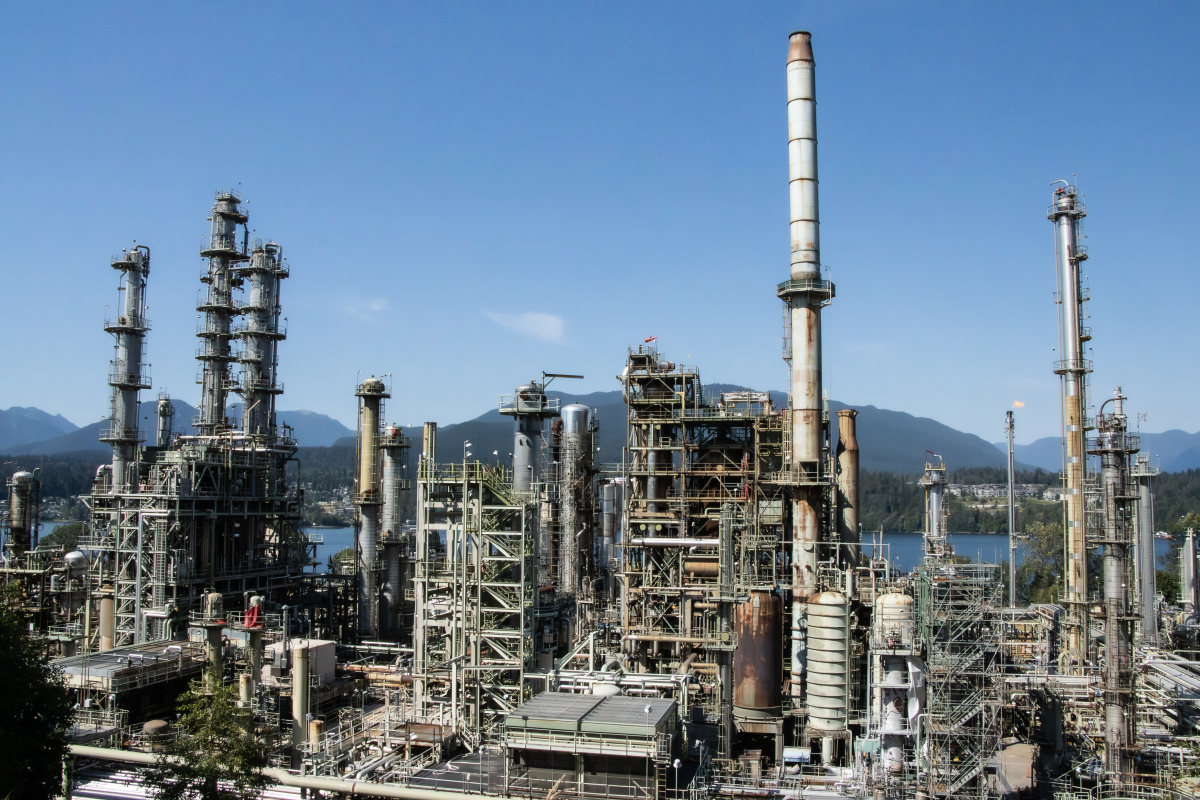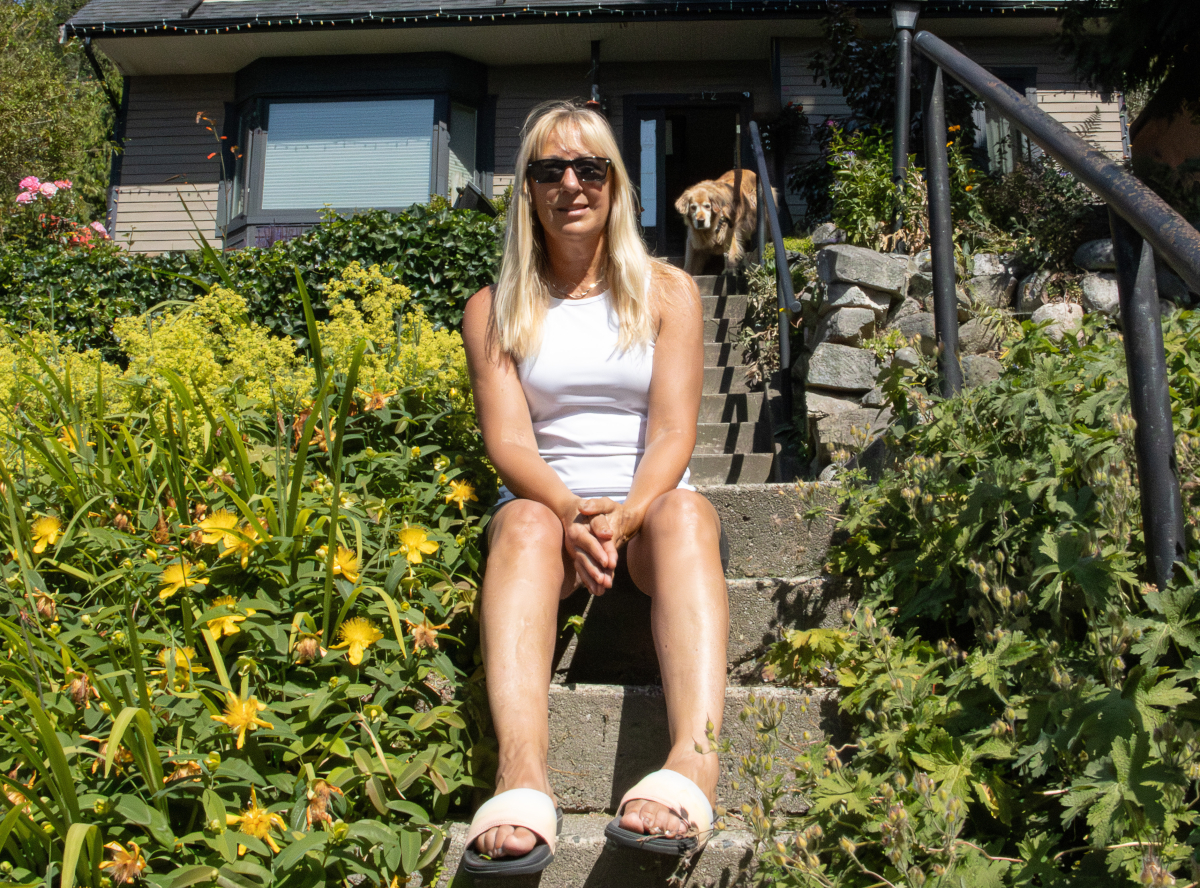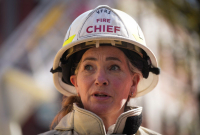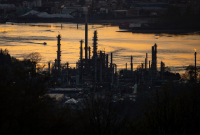Support strong Canadian climate journalism for 2025
For Michele Joel, it is common to head out for an early morning dog walk on her quiet suburban street and be greeted by an oily stench. Although it’s hidden by a steep hill and dense Pacific rainforest, Joel believes the foul smell wafts from Burnaby's Parkland oil refinery about a kilometre from the two-storey house she has inhabited for about 40 years.
"I like to walk my dog at 7:30 in the morning. First thing, when I walk out the front door, it hits you with a smell of oil," she said "The smell is first thing in the morning usually, and during the night. If you open your window at night time, especially in the spring and in the fall when it is overcast, it is really potent."
While stench from the refinery made headlines and took over social media in January when a machinery malfunction smothered large parts of Vancouver in foul-smelling gas, people who live nearer to the facility have long dealt with fumes strong enough to cause nausea and headaches.
A trove of monthly odour complaints to a Metro Vancouver hotline reveal over 200 grievances were filed with the municipal government between August 2022 and November 2023. The documents obtained by Canada's National Observer through an access-to-information request show about 50 people filed complaints, with one person filing 53 between December 2022 and June 2023. They don’t include reports from the January 2024 incident.
In contrast, Montreal, which also has an oil refinery in city limits, only had three odour complaints about the facility from 2021 to present, according to a city spokesperson.
The complaints reveal that areas adjacent to the facility are cloaked in foul smells several times a month. People describe everything from "oily-sewer smells" to "fishy smelling odours" to smells of "dirty bleach" emanating from the facility at all times of day and night.
"This number of complaints is a cause for concern when you consider the types of toxic pollutants emitted by refineries," said Elaine MacDonald, toxics program director for Ecojustice, in an email. "Some pollutants, such as sulphur dioxide, can cause respiratory distress at very low concentrations…others, like benzene, have long-term health impacts, including cancer. Odour also causes mental distress and disturbance and interferes with people enjoying their lives."
Many of the complainants said the smells gave them headaches and nausea, forcing them to retreat into their houses over concern that fumes could be toxic. They also describe being unable to sleep or being awoken by the fumes, and worry the gas exposure might cause cancer and other health risks.
Not all odours are toxic, and the threshold when humans can smell a chemical might be lower than the point when it can severely hurt or kill someone over a short amount of time, said Jeffrey Brook, a professor of public health at the University of Toronto.
"Even just smelling an odour can make you angry. You can lose sleep. That's not good for you. It makes you angry, your blood pressure goes up," Brook said. "Even though the chemicals in the odour aren't [necessarily] at a level that's like directly toxic, this irritation is a health consequence – not just a nuisance."
However, hydrocarbon chemicals are particularly dangerous because long-term exposure to some can cause cancer. Smells can also indicate the presence of other odourless, but more harmful gases impossible to detect without consistent air quality monitoring, he said.

Stress associated with the smells is evident in dozens of the complaints. Take a May 13, 2023 complainant who said they smelled "dirty bleach and some other chemicals I can't identify, but they're noxious [and the smell] gives me a headache as soon as I step onto my back porch. I'm concerned about breathing it in." The documents said this complaint was lodged from the 4200 block of Cambridge St., Burnaby — about 700 metres from the refinery's tank farm and roughly three kilometres from the processing facility.
Another complaint dated October 31, 2023, describes a "chemical, chlorine, exhaust smell…more than one kind of noxious gas, heavy, cloying odour," causing "headaches, nausea and throat irritation." That complaint was filed from the 4100 block of Eton Street, also within a kilometre of the refinery.
MacDonald, of Ecojustice, noted in Sarnia, Ontario — home to Canada's highest concentration of petrochemical manufacturing facilities — the ministry of environment, conservation and parks logged only 609 complaints related to smell over a 10-year period. That’s about five a month, compared to up to several dozen for the Parkland refinery, according to the Metro Vancouver data. (Metro Vancouver is responsible for responding to air quality complaints thanks to provincial rules delegating the task to municipal governments.)
In a Wednesday interview with Canada's National Observer, Julia Saxton, Metro Vancouver's program manager for air quality and enforcement, said her team logs all air quality complaints, notifies Parkland or other possible sources, and assigns them to an inspection officer for review.
The inspector will evaluate the complaint against similar geographical or qualitative information, like whether other people in the area have complained about smells or the wind conditions that day. Sometimes — not always — the officer will visit the location where the smell was reported to try and identify its source, she said.
In an email, Tara Overholt, Parkland's manager of corporate communications, said the company "investigates every odour complaint that is received by Metro Vancouver or the public directly."
When an odour complaint is called in to Metro Vancouver, officials call Parkland's shift supervisor and give them the location of the complaint and a description of the odour, she explained. The supervisor then investigates on-site, even in the middle of the night. If they find an odour that could be coming from the refinery, they then try to find its source and how to mitigate it.
"Very rarely do the shift supervisors actually detect an odour at the location given," she wrote. "Our emissions are strictly regulated via our air permit by Metro Vancouver…we continue to operate within our permit. Any deviations are immediately acted upon and investigated thoroughly."
Up the hill from the refinery, Joel described the relentless work she and her neighbours put into tracking and reporting odours wafting from the facility. While she acknowledges the refinery existed before she moved into her house and shouldn't necessarily be forced to close, she wants to see more stringent air quality rules and monitoring, and better accountability from the company.
Her biggest concern is that the smells signal an issue at the refinery that could also be leaking toxic pollutants into the air. And if people in the neighbourhood don't report the unusual smells, no one will.
"It has gotten better over the years because we're really on it — we're always phoning and complaining," she said. "I think they're very tired of hearing from me."





Comments
Seems to me that it is a law of nature that evil smells spell trouble, otherwise why did skunks evolve as they have? I'd like to know if there is such a thing as a benign bad smell?
Why don't we just defecate in our own yards? Because of the smell? and because the smell warns us that bad, nasty decomposition and germs are just sitting around waiting to make us sick? just one of those things isn't it - seems to be universal.
Apparently we are too stupid to pay attention to something every living creature - except dung beetles knows to avoid I guess they evolved to appreciate the smell, sort of like vultures and other carrion eaters - the designated natural clean up crews. I guess there are just too many stupid humans on earth and not enough carrion eaters.
On the other hand science is always discovering some microbe or other that likes feasting on our waste. Again, just not enough of them to clean up after the pointless human critters.
Why is this legal?
Bottom line: people are MUCH more important than oil.
WTH is going on with Van's city council, provincial government?